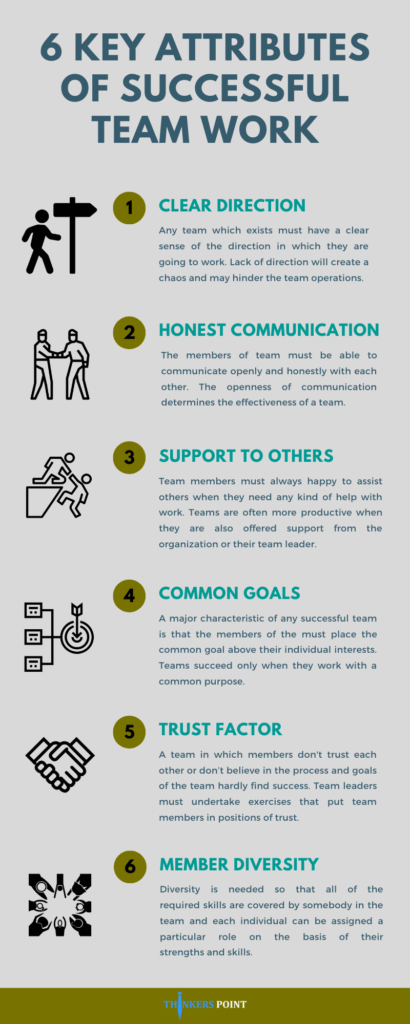As the name suggests, Teamwork means working with a group of people who have a common interest and a common goal to achieve. A team is a group of people who have a common goal and purpose.
Teamwork means that people will work with each other and will try to cooperate with each other, using their skills individually, and by providing constructive feedback, forgetting every personal conflict between them.
A team must include a minimum of 2 or more members, and most teams home in size from 2 to 100. Sports teams generally have fixed sizes based upon set rules, and work teams may change in size depending upon the phase and complexity of the target. Teams got to be ready to leverage resources to be productive (i.e. playing on the fields or meeting spaces, scheduled and decided times for planning, guidance from coaches or supervisors, support from the organization, etc.), and clearly defined roles within the team and players so as for everybody to possess a transparent purpose.
6 Key Attributes of Successful Teamwork

1. Commitment to Team Success
Commitment here means that all the team members should share a common goal, interest, and should be motivated towards the team’s success. If the member of a team gives priority to himself and not to the team then the member is said to be less committed to the team and more committed to his personal well-being.
2. Interdependence
There is no means of success for an individual if the team fails everyone does. There is no possible way for an individual to succeed without his team.
3. Interpersonal Skills
Trust, support, respect, and realistic work-oriented expectations between the members are a must. One cannot expect a newbie to pull the same weight as the senior one. Team members should understand each other and help each other to overcome the mutual team goal.
4. Open Communication
Communication is the key to success. Keeping this in mind, giving and accepting feedback and suggestions should be practiced more often. Moreover, motivating the team spirit of constructive criticism is the most important thing that should be done.
5. Appropriate Team Composition
Team composition basically means choosing a team that can perform every task of every field. Specific tasks are performed by specific roles, and specific roles require specific skill self and specific specialization.
6. Commitment to Team Leadership and Accountability
Nowadays everyone expects some sort of freedom when it comes to decision making, they will accept individual accountability and personal responsibility for their work, more happily.
Effective communication is the most important part of teamwork and involves consistently updating everyone and not assuming that everyone has the same information. Communication is a two-way process; communicating does not only mean speaking, It means listening too. By listening to your colleagues you show them that you respect them and you value their opinion. This is an essential part of building trust and a sense of belonging.
Importance of Teamwork

1. New Ideas
A team consists of a diverse group of people that will always reveal new and innovative ideas to perform the task. This is one of the best importance of teamwork. In the era of different skill sets and levels of experience, new ideas generally mean unique and innovative ideas that are just waiting to be heard.
Creating a team is equal to creating a safe place, where everyone can work without the fear of criticism. Therefore new ideas and perspectives will start to flow.
2. Better Quality
The quality expected from an individual may be too much for him and he may not be able to deliver. But creating a team might completely fulfill your expectation. Teamwork will serve better quality of work as compared to an individual. This serves as the importance of teamwork.
3. Triggers Creativity
This importance of teamwork helps members to work creatively as there are several ideas for a single task. Teamwork is proven to be more creative than the work done by an individual.
4. Leads to Learning
A team consists of members from different areas. They all work together and learn new things about various fields. Therefore, teamwork leads to learning.
Importance of Teamwork in Business
1. Teamwork motivates unity in the workplace

A teamwork environment promotes an environment that fosters friendship and loyalty. These close-knit and very close relationships motivate and help employees in parallel and align them to figure harder, cooperate, and be supportive of one another.
Individuals possess and show diverse talents, soft skills, weaknesses, communication skills, strengths, and habits. Therefore, when a teamwork environment isn’t encouraged this will pose many challenges towards achieving the general goals and objectives. This creates an environment and habitat where employees become focused and dedicated to promoting their own achievements and competing against their fellow colleagues. Ultimately, this can lead to an unhealthy and inefficient working environment.
2. Teamwork offers differing perspectives and feedback
Good teamwork structures provide your organization and company with a diversity of thought, creativity, hard work, perspectives, opportunities, and problem-solving approaches. A proper team environment allows and helps individuals to brainstorm collectively, which successively increases their success to problem solve and reach solutions more efficiently and effectively.

Effective teams also allow the initiative to innovate, successively creating a competitive edge to accomplish goals and objectives. Sharing differing opinions and experiences strengthens accountability and may help make effective decisions faster, than when done alone.
Team effort increases output by having quick feedback and multiple sets of skills inherit play to support your work. You can do the stages of designing, planning, and implementation far more efficiently when a team is functioning well.
3. Teamwork provides improved efficiency and productivity
When incorporating and implementing teamwork strategies, you become more effective, efficient, and productive. This is because it allows the workload to be shared, reducing the pressure on individuals, and ensure tasks are completed within a group time-frame. It also allows goals to be more attainable, enhances the optimization of performance, improves job satisfaction, and increases work pace.

Ultimately, when a gaggle of people works together, compared to at least one person working alone, they promote a more efficient work output and are ready to complete tasks faster thanks to many minds intertwined on the same goals and objectives of the business.
4. Teamwork provides great learning opportunities
Working in a team enables us to learn from one another’s mistakes. You are ready to avoid future errors, gain insight from differing perspectives, and learn new concepts from experienced colleagues.

In addition, individuals and employees can expand and develop their skill sets, discover fresh and innovative ideas from newer colleagues, and thus ascertain simpler approaches and solutions towards the tasks at hand. This active engagement of employees generates and produces the longer-term articulation, encouragement, and innovative and creative capacity to problem solve and generate ideas more effectively and efficiently.
5. Teamwork promotes workplace synergy
Mutual support shared goals, cooperation, and encouragement to provide workplace synergy. With teamwork, team members are ready to feel a greater sense of accomplishment, are collectively liable for outcomes achieve individuals with the motivation to perform at higher levels.

When team members are conscious of their own responsibilities and roles, also because of the significance of their output being relied upon by the remainder of their team, team members will be driven to share the same vision, values, and goals. The result creates a workplace environment supported fellowship, trust, support, respect, and cooperation.
Without the power to effectively add a team environment, you’ll delay the success of developing, formulating, and implementing new and innovative ideas. The ability to problem-solving is reduced and become less, also because the attainment of meeting goals and objectives, in turn, limiting the efficiency and effectiveness of growing a successful company is hindered.
How To Manage Teamwork
Leading a team is usually a tiring and demanding venture. With numerous moving pieces, finding the proper balance from week to week can feel overwhelming. Luckily, there are numerous techniques to form team management much simpler and more rewarding.
As you set together a team for your project you’ll begin to ascertain the simplest ways to help them, what goals to t, I, me, and the way to effectively communicate with one another. These strategies improve as time progresses, but there are some steps you can take to expedite the process.

Never allow yourself to blindly trust and jump into a project without first reviewing ways to develop and create a united group of teammates. Let’s take a glance at some team management tips which will make your job easier.
1. Establish a Team Mission
While your team should have regimented, day-to-day goals, there should even be a long-term goal you’re all trying to succeed in. Open up a discussion for your team members to supply insight or suggestions on this matter. Use this feedback to line a team mission for all of you to figure toward a day.
2. Delegate Tasks Effectively
It’s easy for tasks and responsibilities to fall by the wayside when there are multiple people performing on an equivalent project. Effective team management ensures each member of the team features a workload that matches their skills and keeps them engaged. Oftentimes, this will mean teaming up multiple people to collaborate on certain tasks together.
3. Maintain Open Communication
Keeping communication channels wide open is significant to the success of any project. Using a tool like Tackle Plan can help your team remember of timelines, individual assignments, and allows them to debate details about those tasks with each other. These abilities allow your project to run smoothly and avoid responsibility to overlap or deadlines being missed.
4. Resolve Team Issues
Unfortunately, teams can disagree on things from time to time making resolution a crucial aspect of your job. These issues don’t always work themselves out, so there could also be times where you would like to step in and help those involved find an answer or reach a compromise. Avoid large group problems by addressing conflicts directly.
5. Do Your Part and More
Team management isn’t about pointing a finger and easily giving instructions for others to try to all the work. Especially when deadlines approach, or the workload is falling behind, be readily available to leap in and help however needed. Your team members will have more respect for you as they see your exerted efforts, which will push them to work harder as well.
6. Hold Team Building Events
Your group and team should be a team both in and out of the office. While they don’t need to be best friends, holding team building activities like volunteering, hour, or maybe an evening of laser tag can drastically improve team rapport. These sorts of events help your team to ascertain one another in real-world scenarios, making it easier for them to speak and work with each other.
7. Cheer on Your Team
As the team manager, you ought to be your group’s biggest cheerleader on a day today. Your team should feel appreciated for all of the diligence they are doing, and it’s your job to make sure they need that sense of accomplishment. Motivate your group with short pep talks or one-on-one encouragement sessions to spice up team morale.
Limitations of Teamwork

1. Group Think
Thinking is the first step in every process. When people think in a group there are chances that the idea given by them is less likely than the other person’s idea, this creates disputes.
2. Complex Process
Teamwork has always been a complex process. From dividing the work to the deadline of submission, every step is complex in its way.
3. Conflict
Teamwork leads to conflicts between members. When the members don’t accept criticism in a healthy way they give rise to conflicts. This is the cause of delay in work and this compromises quality of work.
4. Evaluating an Individual’s Contribution
While working in a team it has been observed that it is tough to evaluate every individual’s contribution. This has a major drawback that the person working hard and a procrastinator are treated in the same way.
Frequently Asked Questions:
Ans a) Divide up the work
b) Ask for help
c) Work out loud
d) Share a prototype
e) Build in a review process
f) Rally to a common goal
g) Celebrate together
Ans The five functions are trust, conflict management, commitment, accountability, and focusing on results. To have a functioning team, one thing is a must and that is Trust. Trust is the foundation of a good team.
Ans a) Police and Sheriff’s Patrol Officers.
b) Natural Sciences Managers.
c) Chefs and Head Cooks.
d) Athletes and Sports Competitors.
e) Human Resources Managers.
f) Construction Managers


Pingback: Soft Skills | Important top 10 soft Skills in 2020 | Thinkerspoint
Pingback: Dependability in the workplace Leads to success: Are You Dependable?
Pingback: What is Leadership? | What are the essential qualities of a true leader?
Pingback: EFFICIENCY - Improving Bottom Line Profits - Thinkers Point
Pingback: Flexibility | ThinkersPoint | Defination and Importance
Pingback: Support: A Teamwork Skill | Soft Skill | ThinkersPoint
Pingback: Interpersonal Communication Skills | ThinkersPoint
Pingback: Importance of Ideas in Teamwork | How does it increase effeciency?
Pingback: DELEGATION IN TEAMWORK - Thinkers Point
Pingback: Soft Skills | Importance of soft Skills | Thinkerspoint